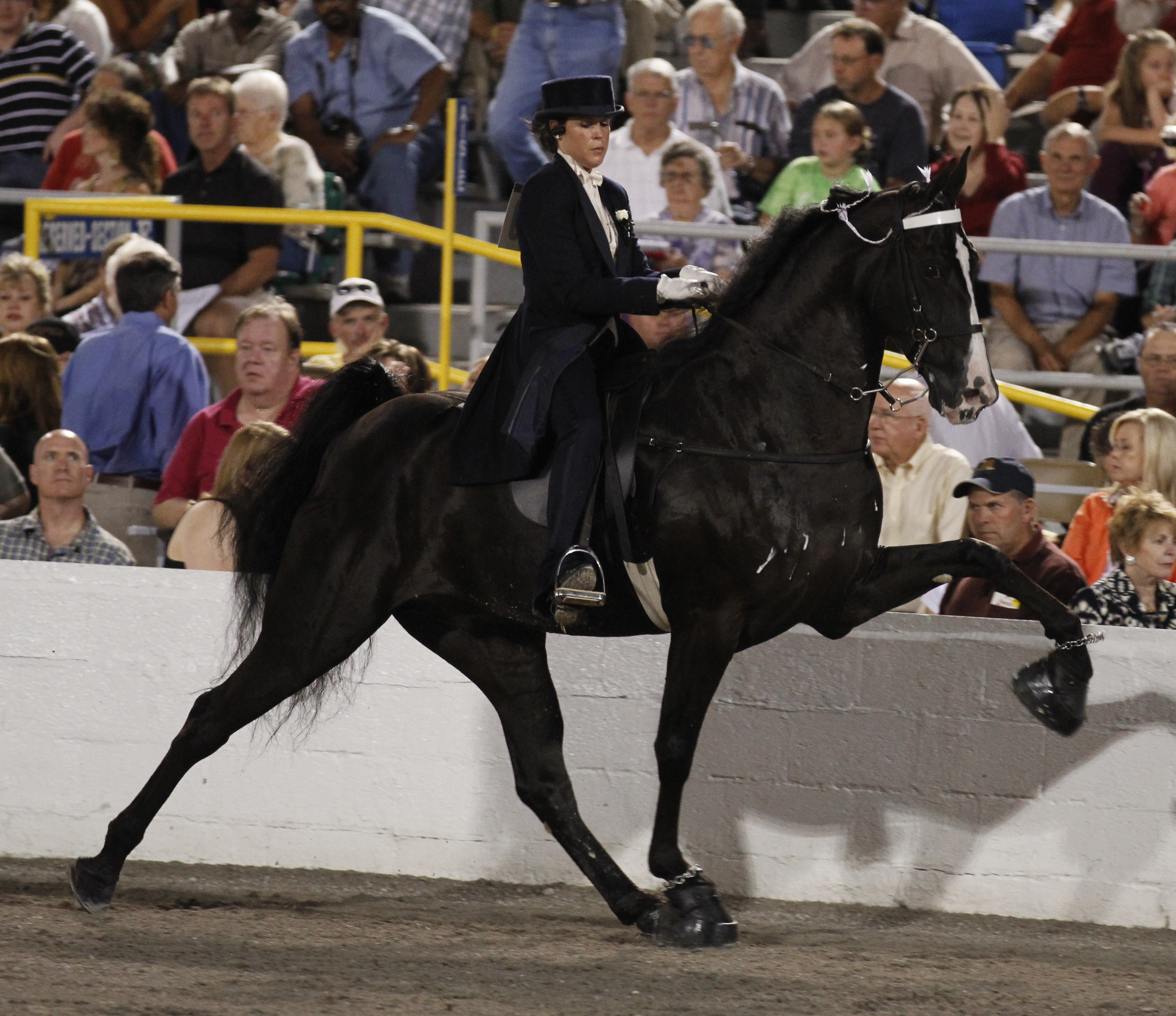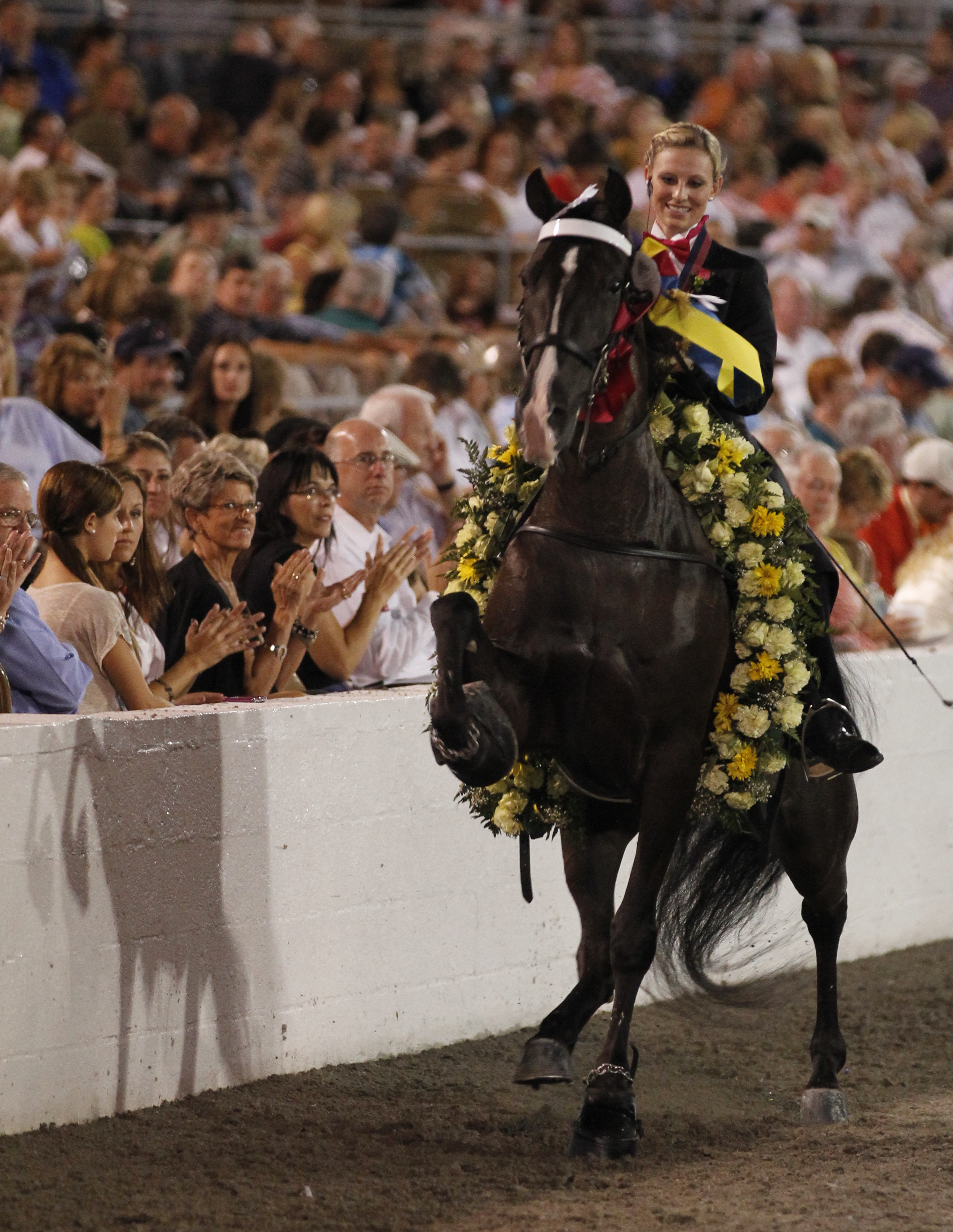74th Tennessee Walking Horse National Celebration ends, not controversy
Friday, January 1, 1904
2012 CHAMPIONSWorld grand champion walking horse - Walk Time Charlie, owned by Holland, Kilgore & Callicutt of Decatur Ala.The Reserve Champion - I'm Copperfield, owned by Mike Walden, of ChattanoogaJunior World Grand Champion (4-year-olds) - Honors, owned by Dan, Keith and Kelley McSwin, of Gainesville and Duluth, Ga.3-year-old World Grand Champion - Jose It Ain't So, owned by Deborah Williams of Argyle, Texas• There are 176 classes in the 11-day event. For a complete list of winners, see Monday's Chattanooga Times Free Press.Source: Tennessee Walking Horse National Celebration
SHELBYVILLE, Tenn. - The granddaddy of Tennessee walking horse shows drew to a rocky close Saturday, but the winners and losers of a two-week mud-slinging contest over the state's high-stepping icon are far from decided.
With the widely publicized crackdown on horse abuse in the months leading up to the event, this 74th Tennessee Walking Horse National Celebration promised to be a powder keg.
It was.
The disqualification of eight horses for soring violations or illegal equipment halfway through the first night lit an already smoldering fuse.
Midway through the 11-day Celebration, the industry claimed that "independent" inspectors offering a second opinion indicated many horses were "wrongly" dismissed.
By the morning of the last day, most classes held only about half the number of entrants that were listed on the program, indicating many had been dismissed in pre-show inspections, and still more didn't enter the ring because their riders shied away from the daunting scrutiny.
Concern spread even to grandstands, evidenced by the empty seats.
Celebration diehards said they were surprised at the number of police and security guards. Celebration announcers gave a first-ever warning about what the audience should do in the event of a "disruption."
In the end, the paramount question is whether the walking horse world, soiled again by concerns of animal abuse, will find reform -- something both industry and animal rights groups say they want.
But the answer may be awhile taking shape.
• There's a lawsuit still to be decided.
The largest walking horse industry groups, the Celebration and its lay inspector group dubbed SHOW, are fighting tougher federal mandatory soring penalties. Claiming they worry about fairness because not all horse shows have equal oversight, they have challenged the new rules, saying tougher penalties will simply drive competitors to mom-and-pop shows.
• The largest group of show lay inspectors may soon be defunct.
The U.S. Department of Agriculture, which enforces the Horse Protection Act, has begun a process to decertify SHOW, which stands for Sound Horses, Honest Judging, Objective Inspections, Winning Fairly. Federal regulators say the lay inspectors have refused to adopt mandatory penalties that would apply trainer and owner suspensions more consistently. SHOW has appealed.
• More criminal charges may be in the offing.
Three defendants pleaded guilty and await sentencing in Chattanooga's U.S. District Court this year to soring violations. And with eight cases made in the past 18 months -- the first in the Horse Protection Act's 40-year history -- there is opportunity for quite a bit of goverment-witness "cooperation."
The Humane Society of the United States, which made hidden-camera videos of abuse in trainer Jackie McConnell's barn and presented it to prosecutors to make their case, is calling for owners and show managers to be charged next.
SHAPING THE DEBATE
The country was shocked this summer by video on prime-time news showing Jackie McConnell and his stablehands abusing horses in the name of training them to step high. Many in the industry knew McConnell's barn had been raided by federal agents during the 2011 Celebration.
Celebration officials announced they were hiring a crisis management and public relations firm, Purple Strategies, that helped BP after the Gulf Oil Spill.
"Of course money to combat public opinion and image is an ever constant hurdle. ... At present date $400,000 has been raised," wrote one blogger for Walking Horse Club Ky., about the effort to get the walking horse industry's story out.
But time will tell the success of that effort, too.
The mud-slinging that ensued -- tit-for-tat news conferences with the Humane Society of the United States and a USDA-disputed claim that the government did not share its "scientific" swab testing formulas -- seemed out of place following the first soring prosecutions in 40 years and hidden-camera videos of horse abuse.
This year's 11-day Tennessee Walking Horse National Celebration struggled most nights to fill even half of the 30,000-seat Calsonic Arena.
In many classes each night, only half of the contestants listed in the program made it into the ring, either because their horses were disqualified or because they chose not to present their horses for inspection.
Celebration officials said USDA inspectors wrote five times the number of citations for scar rule violations -- one indicator of soring -- during the first week of competition as were written during the entire Celebration last year.
On Saturday, Jennifer Baker with Purple Strategies said the horse industry has complained to U.S. Rep. Chuck Fleischmann, R-Tenn., of what she called "retaliatory behavior on the part of USDA inspectors."
She released a letter from Fleischmann to Rep. Thomas Rooney, R-Fla., chairman of the Subcommittee on Livestock, Dairy and Poultry, asking him to hold a hearing on "some of the concerns raised by owners, trainers, inspectors and other participants" in the industry.
NEW LEGISLATION
Keith Dane, the Humane Society's director of equine protection, says his group will call this year for pads and chains to be outlawed, just as caustic acid and foreign objects placed between the horse's foot and the pads already have been.
Soring experts, like convicted sorer Barney Davis, say one can't work to achieve a "big lick" without the other.
Davis, required by his sentencing to participate in an educational video about soring, talked about how soring is done in a new clip released last week by the Humane Society.
"If you didn't use the chain it would have no purpose for the chemical," he says in the video.
A few moments later, he adds:
"Putty puts pressure on the bottom of foot. It's the same purpose of a bolt. It hardens. They take it out before they go to the show. But the sore is already there. The only way you're going to get the soring stopped is to get the pads and the chains."
Davis doesn't blame just the trainers.
Veterinarians know what's going on, he said. "They're the ones selling you the pain medicine to cover it up."
And owners, too, must take responsibility, he said.
"A lot of the owners can't be that dumb to know there's not something wrong when [a horse] walks like that. A horse will not walk on his hind legs unless he's sore. That's just common sense."


